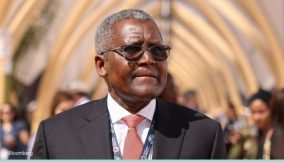The Institute for Governance and Economic Transformation (IGET) has advocated for increased spending in education, healthcare and the abolition of the Land Use Act as viable solutions to lift over 133 million poor Nigerians out of poverty.
IGET is a policy think-tank founded by Kingsley Moghalu, former deputy governor of the Central Bank of Nigeria(CBN) and “It is an independent, nonpartisan and innovative public policy think tank that works to support African countries to improve knowledge, design and implementation of public policy in the areas of sustainable development and inclusive economic growth, business and finance, and improving the efficiency and effectiveness of governance – including accountability and transparency systems to combat corruption.”
On IGET’s advisory board are eminent dignitaries including Muhammadu Sanusi II, former CBN governor as chairman, Andrew Nevin as vice chairman, while other members are Franz Baumann, Tamela Hultman, Richard Ikiebe, Ifeoma Nwakoby, and Tayo Oviosu.
IGET’s policy document tagged “Nigeria’s Poverty Trap-And How to End It” was released today sequel to the publication of Nigeria’s multidimensional poverty report by the National Bureau of Statistics (NBS) which indicated that over 133 million Nigerians live below poverty line.
A poverty trap exists when it is difficult for poor people to escape poverty. It also means a system that requires a huge amount of capital for poor people to escape poverty thereby engendering a situation known as “poverty begets poverty” which suggests that poverty today is the cause of poverty in the future.
The IGET’s report identifies ways to end the increasing population of hungry Nigerians through inclusive growth.
Read also: Hope rises for patients as UBTH gets $500,000 ICU centre
“As a top priority, increased and carefully targeted investments in healthcare and education, creating an environment that encourages the creation of jobs in the private sector, bold fiscal reforms to increase government revenue through effective taxation and the elimination of wasteful fuel subsidies while mitigating the potential effects of subsidy removal on already poor citizens, and such other macroeconomic reforms as exchange rate adjustments.
“Abolition of the Land Use Act, civil service and security reforms to improve state capacity and gender empowerment, intensified family planning education and services, and resolution of the conflicts (or “silent wars”) in various parts of Nigeria that have caused and exacerbated poverty through internal displacement and decreased food production are all structural changes necessary to enable millions of Nigerians to escape the poverty trap,” the IGET’s report stated.
Discussions on inclusive growth focused on the eradication of poverty in Africa’s most populous and biggest economy have received significant attention from public officials and private sector players. The rising interest rate, inflation rate and unemployment make the monetary and fiscal options limited to the CBN and the executive arm of government.
According to NBS, “approximately 70% of Nigeria’s population live in rural areas, and 30% in urban areas. Yet rural areas are home to 80% of people living in poverty, and the intensity of their poverty is also higher, at 42% in rural areas compared to 37% in urban areas.”
“According to the Nigeria MPI , 62.9% of people—just under 133 million people—are multidimensionally poor, meaning that they experience deprivations in more than one dimension, or in at least 26% of weighted indicators. The average deprivation score among poor people, which shows the intensity of poverty, is 40.9%. The Nigeria MPI (2022) is 0.257, showing that poor people in Nigeria experience just over one-quarter of all possible deprivations,” NBS stated.
IGET suggests that the next president must provide clarity on how to eradicate poverty in the country, adding that a key necessity for poverty eradication is philosophical clarity on the roles of state and market in reducing poverty. The policy think tank also listed the abolition of the Land Use Act as one of the catalysts for addressing the problem in Nigeria.
The Nigeria MPI (2022) has four dimensions: health, education, living standards, and work and shocks.
Join BusinessDay whatsapp Channel, to stay up to date
Open In Whatsapp





